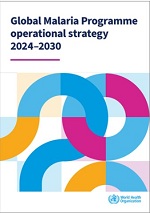 |
| Photo: Centre for Integrated Health Programs |
WHO Global Malaria Programme introduces new operational strategy
On the occasion of World Malaria Day, the WHO Global Malaria Programme has unveiled a new operational strategy that details its priorities and essential actions through 2030, aimed at altering the course of malaria trends to meet global malaria targets. The strategy identifies four main strategic objectives for WHO's focus: creating norms and standards, implementing new tools and innovations, advancing strategic information for impactful results, and offering technical leadership in the global fight against malaria. Recent years have seen stagnation in achieving key targets of the WHO Global Technical Strategy for Malaria 2016-2030, especially in high-burden countries. In 2022, there were approximately 608,000 malaria-related deaths and 249 million new malaria cases worldwide, with young children in Africa being the most affected. Millions of individuals still lack access to necessary services for malaria prevention, detection, and treatment. Progress has been hindered by limited resources, humanitarian crises, climate change, and biological threats like drug and insecticide resistance. "A shift in the global malaria response is urgently needed across the entire malaria ecosystem to prevent avoidable deaths and achieve the targets of the WHO global malaria strategy," notes Dr Daniel Ngamije, Director of the Global Malaria Programme. "This shift should seek to address the root causes of the disease and be centred around accessibility, efficiency, sustainability, equity and integration." Strategic Objectives The WHO Global Malaria Programme is pivotal in leading efforts to control and eliminate malaria worldwide. With a presence in 150 countries, the Programme can significantly influence the malaria ecosystem and achieve substantial impact at the national level. The new operational strategy encompasses four strategic objectives: 1. Develop and disseminate norms and standards. Evidence-based technical recommendations are crucial in the malaria fight. Normative guidance helps translate evidence into action, aligning countries and partners under a unified technical vision and strategy. The Global Malaria Programme is responsible for guiding the research agenda and analyzing evidence to inform global policy. 2. Stimulate the development and timely introduction of new tools and innovation. While existing tools can yield more progress, new interventions are necessary to accelerate gains and counter emerging threats. The Global Malaria Programme plays a key role in facilitating the evaluation and introduction of new malaria control tools, collaborating with various partners to provide an evidence base for their effective scale-up. 3. Promote the use of strategic information for impact. Monitoring, evaluating, and reporting on malaria trends are central to setting priorities and decision-making at all levels, from local actors to international donors. WHO's work includes global and national equity monitoring and support for local barrier assessments to better understand gaps in malaria interventions. 4. Provide technical leadership of the global malaria response. WHO leads and coordinates the UN health agenda at both the country and global levels. The organization has a core responsibility to convene key stakeholders, define and advocate for priority activities, and empower communities to access quality health services. The Global Malaria Programme exemplifies this core WHO function in the malaria ecosystem. Guiding Principles The new operational strategy is underpinned by three equity-oriented principles: � Country Ownership and Leadership. Efforts to combat malaria must be fully owned and led by countries, with adequate domestic investment and a multisectoral response. A country-led approach promotes inclusive governance, accountability, and tailored interventions. � Resilient Health Systems. Successful national malaria responses depend on strong primary healthcare systems capable of responding to emerging needs and providing quality care for all, including those with malaria. � Equity in Access to Quality Health Services. Malaria control efforts should be rooted in equity, gender equity, and human rights principles to ensure that the most vulnerable populations have access to quality health services and malaria interventions. The focus on equitable access to malaria services is central to this year's World Malaria Day theme: "Accelerating the fight against malaria for a more equitable world." This theme is also a key aspect of the Yaounde Declaration, signed in March 2024 by African Ministers of Health from malaria-affected countries. The declaration commits to ensuring that all at-risk populations consistently receive appropriate tools, even in hard-to-reach areas and conflict zones. As WHO's technical department for malaria, the Global Malaria Programme plays a crucial role in spearheading the global fight against this disease. Leveraging its direct initiatives and extensive network, it can influence the malaria landscape and create substantial impact at the national level. To this end, the Global Malaria Programme has crafted an operational strategy for 2024-2030, highlighting its priorities and four strategic levers for malaria control and elimination: norms and standards, new tools and innovation, strategic information for impact, and leadership. This strategy also outlines how the Programme will evolve by enhancing collaboration with other WHO programmes, regional and country offices, and partners, informed by insights from WHO's Thirteenth General Programme of Work (GPW13) and the priorities of GPW14. |
|

